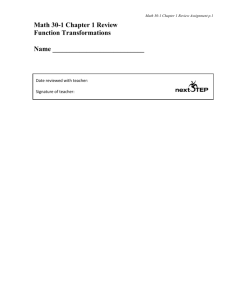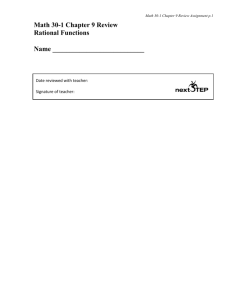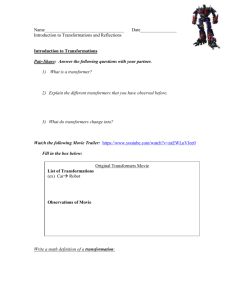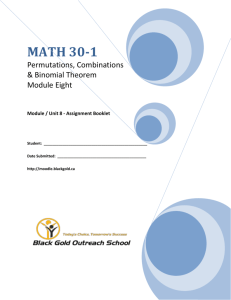or y = -f(x)
advertisement
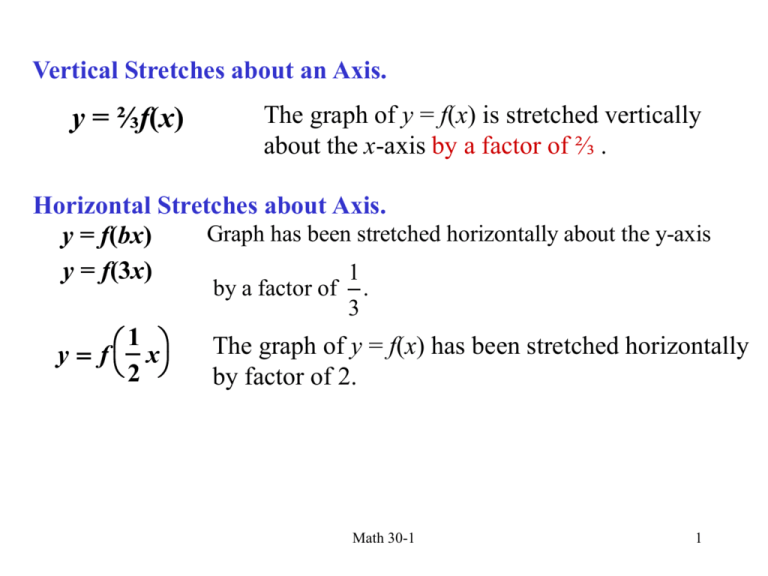
Vertical Stretches about an Axis. y = ⅔f(x) The graph of y = f(x) is stretched vertically about the x-axis by a factor of ⅔ . Horizontal Stretches about Axis. Graph has been stretched horizontally about the y-axis y = f(bx) y = f(3x) 1 by a factor of 1 yf x 2 3 . The graph of y = f(x) has been stretched horizontally by factor of 2. Math 30-1 1 y k af (b( x h)) ** You must factor out the stretch if there is also a translation** y + 4 = f(3x – 12) 1. Factor 2. Stretch 3. Translate y + 4 = f(3(x – 4)) Math 30-1 2 The graph of the function y = f(x) is transformed to produce the graph of the function y = g(x) An equation for g(x) in terms of f(x) is A. 1 g ( x) f (3x) 2 B. g ( x) 2 f (3x) C. g ( x) 1 2 1 f x 3 D. g ( x) 2 f 1 x 3 Math 30-1 3 1.2B Reflections y af (bx) 1.2B Exploring Reflections Math 30-1 4 Reflect the Graph of y = f(x) in the x-axis f(x) = | x | (-6, 6) (6, 6) Family of Functions f(x) = | x | (-2, 2) (2, 2) (2, -2) (-2, -2) f(x) = -| x | f(x) = -| x | (-6, -6) (6, -6) Math 30-1 5 Reflections in the x-axis affect the y-coordinate. y af ( x) where a 0 Notice (x, y) → (x, -y). The variable y is replaced by (-y) in the ordered pair and in the function equation . y = f(x) → -y = f(x) or y = -f(x) The original equation y = |x| maps to -y = |x| or y = -|x| The invariant points are on the line of reflection, the x-axis. The invariant points would be the x-intercepts Math 30-1 6 Reflecting y = f(x) Graph y = -f(x) y = f(x) y = -f(x) Domain and Range Math 30-1 7 Graphing a Reflection of y = f(x) in the y-axis (-7, 7) (-5, 5) (-7, 3) Notice domain and range.Math 30-1 (7, 7) (5, 5) (7, 3) 8 Reflections in the y-axis affect the x-coordinate. y f (bx) where b 0 Notice (x, y) → (-x, y). The variable x is replaced by (-x). y = f(x) → y = f(-x). The original equation x - 5 = 0.5(y - 5)2 becomes (-x) - 5 = 0.5(y - 5)2 The invariant points are on the line of reflection, the y-axis. The invariant points would be the y-intercepts. Math 30-1 9 Given the graph of f(x), graph the image function g(x) that would be the graph of f(-x). f(x) g(x) If the point (6, -1) is on the graph of f(x), what would be the corresponding point on the graph of g(x). (-6, -1) Math 30-1 10 Which transformation is true regarding the two graphs g(x) = f(-x) y f ( x) g(x) = -f(x) f(x) = g(-x) y g ( x) f(x) = -g(x) Math 30-1 11 Transformations of Functions Given that the point (2, 6) is on the graph of f(x), state the corresponding point after the following transformations of f(x). a) f(x - 3) - 4 (5, 2) b) -f(x + 2) - 1 (0, -7) c) f(-x + 2) + 3 f(-(x - 2)) + 3 (0, 9) Math 30-1 12 True or False The graph of y = -f(-x - 2) – 3 is a horizontal translation of the graph of y = f(x) 2 units right. Multiple Choice Which of the following transformations on y = f(x) would have the y-intercepts as invariant points? A. - y = f(x) B. y = f(-x) C. y = f(x + 2) D. y = 2f(x) Order of Transformations: 1. Factor 2. Reflections 3. Stretches 4. Translations Math 30-1 13 Transformation Summary Type of Transformation Replace what in equation? With What? Resulting Effect Vertical Translation y y-k Graph moves k units up. y-k = f(x) Vertical Translation y y+k Graph moves k units down. y + k = f(x) Horizontal Translation x x-h Graph moves h units right. y = f(x - h) Horizontal Translation x x+h Graph moves h units left. y = f(x + h) Vertical Reflection y -y Graph is reflected in the x-axis y = -f(x) Horizontal Reflection x -x Graph is reflected in the y-axis y = f(-x) Resulting Equations 14 Page 28 1,3, 5c,d, 7b,d, 10, 15 Math 30-1 15
